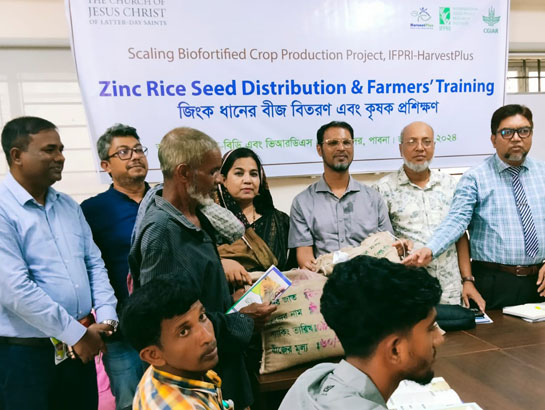The “Scaling of Biofortified Crop Production” project implemented by HarvestPlus Bangladesh and supported by The Church of Jesus Christ of Latter-day Saints, aims to increase awareness and access to climate-smart, biofortified planting materials, boost production of nutrient-rich crops, and improve the enabling environment for nutritious foods. This is achieved through market connections and evidence-based advocacy efforts with local stakeholders. The project promotes zinc rice as a sustainable and nutritious alternative to conventional non-biofortified rice in the daily diets of Bangladeshi communities.
Before the project, many people in the target areas of Sirajganj, Pabna, and Natore districts in the Rajshahi division were unaware of the nutritional benefits of zinc rice. Through focused interventions, the project has successfully educated farmers, rice value chain actors, professionals, and journalists about the importance and advantages of zinc rice.
HarvestPlus began its zinc rice delivery program in Bangladesh following the development of the “BRRI dhan62” variety by the Bangladesh Rice Research Institute (BRRI) in 2013. This was the world’s first biofortified zinc rice variety. Since 2019, HarvestPlus has focused on scaling and commercialization, working with both public and private sectors to ensure the availability of zinc rice seeds and an enabling environment for its adoption.
The Scaling of Biofortified Crop Production project’s outreach extends across various levels of society, directly benefiting farmers who consume their own produce. Through this initiative, 2,100 farmers received zinc rice seeds, planting them for the first time. The response has been overwhelmingly positive, with farmers embracing zinc rice as a vital source of nutrition for their families. Many expressed satisfaction and gratitude for the new opportunity, with one of the farmers, Md. Shafiqul Alom, stating that if the crop performs well, he plans to save the seeds for future cultivation. During seed distribution, farmers also received orientation and training on cultivation techniques and the health benefits of zinc, particularly for women and children. This has raised awareness about micronutrients and their importance for family health.
In partnership with HarvestPlus Solutions Bangladesh (NAF-BD) and Voluntary Rural Development Society (VRDS), HarvestPlus is implementing the project in Sirajganj, Pabna, and Natore districts of the Rajshahi division. The project aims to increase access to climate-smart biofortified planting materials, enhance biofortified crop production, and improve market connections through evidence-based advocacy with local stakeholders.
The project also held advocacy meetings, engaging district officials from various government departments, including the Department of Agricultural Extension (DAE), Directorate of Food, Civil Surgeon’s Office, Bangladesh Agricultural Development Corporation (BADC), Agricultural Information Services (AIS), and the Department of Agricultural Marketing (DAM), along with journalists, seed dealers, and agro-business representatives. These stakeholders were highly motivated to learn about zinc rice, with some even taking steps to adopt it for personal consumption.
Sharif Ahmed, Additional Deputy Commissioner (General) of Pabna, expressed his gratitude to HarvestPlus, acknowledging the nutritional value of zinc rice, particularly for cognitive development in children. He encouraged the BADC to enhance zinc rice seed production and urged further awareness-raising efforts across districts. Similarly, Md. Rassel, Medical Officer from the Civil Surgeon’s Office in Natore, praised HarvestPlus for its health-focused initiatives, emphasizing the daily necessity of zinc for the human body.
Agro-business leaders also played an active role, with Rubina Khatun, a national award-winning businesswoman from Natore, advocating for the engagement of more farmers in zinc rice cultivation. She emphasized that bottom-up approaches would accelerate the intervention’s success.
The discussions highlighted several strategic measures to scale biofortified rice production:
- Prioritizing government procurement of biofortified paddy and its distribution through social safety-net programs.
- Raising mass awareness on zinc rice production and consumption to promote health and nutrition security.
- Optimizing rice milling processes to retain micronutrients in the grain during processing.
Looking ahead, the project plans additional interventions, such as training government extension agents, conducting linkage workshops with grain value chain actors, and holding a “Nutri-Champ” competition to promote innovative zinc rice recipes for broader commercial use.
